Advanced Reactor Concepts (ARC) A New Nuclear Power Plant Perspective Producing Energy
Auteurs : Zamani Paydar Ali, Kamal Mousavi Balgehshiri Seyed, Zohuri Bahman

Nuclear engineers advancing the energy transition are understanding more about the next generation of nuclear plants; however, it is still difficult to access all the critical types, concepts, and applications in one location. Advanced Reactor Concepts(ARC): A New Nuclear Power Plant Perspective Producing Energy gives engineers and nuclear engineering researchers the comprehensive tools to get up to date on the latest technology supporting generation IV nuclear plant systems. After providing a brief history of this area, alternative technology is discussed such as electromagnetic pumps, heat pipes as control devices, Nuclear Air-Brayton Combined Cycles integration, and instrumentation helping nuclear plants to provide dispatchable electricity to the grid and heat to industry. Packed with examples of all the types, benefits, and challenges involved, Advanced Reactor Concepts (ARC) delivers the go-to reference that engineers need to advance safe nuclear energy as a low-carbon option.
About the authors Acknowledgments. Preface 1. Next Generation Nuclear Plant (NGNP) 2. Electromagnetic Pump for Large Pool Liquid Metal Fast Breeder Reactor Concept 3. Nuclear Power Reactors Driven Radiation Harden Environments 4. Heat pipe application driven fission nuclear power plant 5. Nuclear thermal hydraulics: Heat, water, and nuclear power safety 6. Traversing in-core probe (TIP) system, nuclear instrumentation, and control 7. Heated junction thermocouple system 8. Gamma thermometer (GT) system Appendix A Index
Seyed Kamal Mousavi Balgehshiri is currently carrying out strategic studies on the programs and strategies of different countries in the field of nuclear energy, advanced nuclear reactor development and also energy planning and modeling. Studying the strategies of advanced nuclear countries in diversifying and supplying nuclear fuel based on the “reactor-fuel cycle network is another area of his work. Seyed earned a bachelor’s degree in chemical engineering from the University of Tabriz, and a master’s degree in nuclear engineering, majoring in fuel cycle and materials, from Amirkabir University of Technology (Tehran Polytechnic). Seyed has published several papers and books on nuclear technology.
Dr. Bahman Zohuri is currently an Adjunct Professor in Artificial Intelligence Science at Golden Gate University, San Francisco, California, who runs his own consulting company and was previously a consultant at Sandia National Laboratory. Dr. Zohuri earned his bachelor’s and master’s degrees in physics from the Unive
- Describes theory and concepts on generation IV technology such as advanced reactor concepts (ARC) and electromagnetic pumps, and compares different types and sizes.
- Sets out the energy transition with critical carbon-free technology that can supplement intermittent power sources such as wind and solar.
- Explains alternative heat storage technology, including Nuclear Air-Brayton Combined Cycles.
- Introduces advanced main instrumentation systems for in-core probes.
Date de parution : 07-2023
Ouvrage de 452 p.
15.2x22.8 cm
Thème d’Advanced Reactor Concepts (ARC) :
Mots-clés :
Next generation; molten salt reactor; small modular reactor; power plant; heat pipe; Air-Brayton; NACC; NGNP; ARC; electricity



